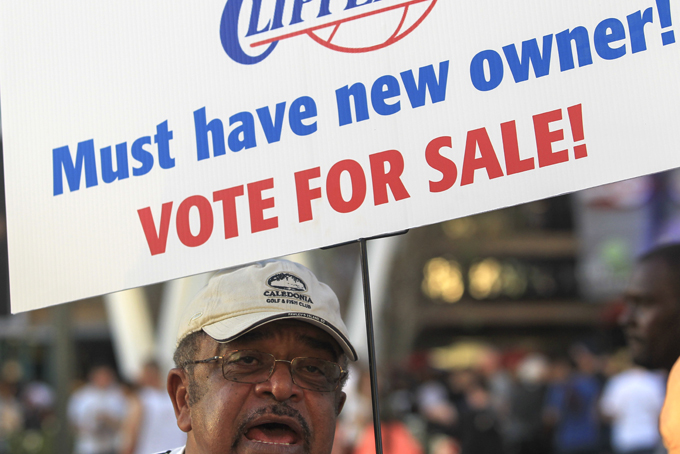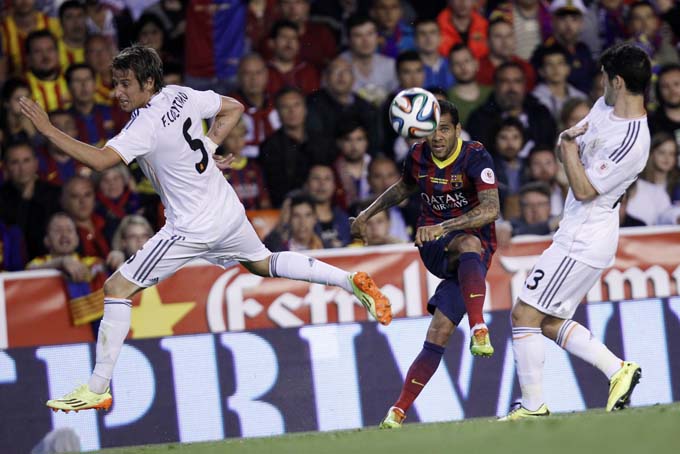
The NBA’s life ban for Los Angeles Clippers owner Donald Sterling won swift support in Europe, but it also produced calls for soccer to show similar resolve against racism.
The two most powerful men in soccer – Sepp Blatter, president of international governing body FIFA, and his European counterpart Michel Platini – both voiced approval on Wednesday.
Blatter tweeted: “Sport says no to racism. I fully support @NBA’s decision to ban @LAClippers owner for life after his racist words.”
In a statement to The Associated Press, Platini said: “It is a great decision and I support it completely.”
NBA Commissioner Adam Silver “has not been in his job for a long time, but he has shown great strength by punishing what is unacceptable behavior by one of the owners,” the UEFA president said.
Silver banned Sterling for life, fined him $2.5 million and pressed other team owners to support his desire to make Sterling sell the Clippers.
Patrick Vieira, a 1998 World Cup winner with France, tweeted: “Well done to @NBA, another organisation dealing with racism in exactly the right way. I say again – zero tolerance.”

Overt racism in stadiums has dogged soccer for decades. Last weekend, a Villarreal season-ticket holder threw a banana at Barcelona defender Dani Alves, who is Black. Spanish police arrested the man and Villarreal banned him for life from its stadium. Alves picked up the banana and took a bite, provoking a social media campaign against racism in support of the Brazilian player.
Critics have long accused soccer leaders of being too soft on teams with racist fans. To some in Europe, the swift rejection of Sterling by NBA players, executives and owners served only to highlight the lack of resolve by soccer officials.
Retired British NBA player John Amaechi, in a phone interview with the AP, wondered why soccer can’t respond to repeated instances of racial abuse during matches.
“It’s time that we started looking at some of the owners within other parts of sport,” outside the NBA, he said. “They’re exactly the type of plantation mentality people who don’t mind having black people working for them … But God forbid that they want to come up to the big house.”
Amaechi said he doesn’t expect the NBA’s punishment of Sterling will jolt soccer into meaningful change. Blatter’s tweet of support for the NBA was “not enough,” he added.
“If there was a poster-person for the words ‘impotence’ and ‘apathy,’ it would have his face on it,” Amaechi said.
“You know what they’re going to do? They’re going to produce another pretty poster with platitudes plastered all over it. They’re going to produce another campaign that has a black player (standing) next to a white player,” he said. “Nothing substantive.”
Former England and Liverpool winger John Barnes, targeted for racist abuse at the height of his career in the 1980s, said it was unfair to expect soccer to draw lessons from the NBA’s handling of Sterling. He noted the NBA has greater powers over club owners than European soccer leaders have in similar circumstances.
“We can learn nothing from that until the (football) associations become much more powerful, which they never will because we know that the clubs are much more powerful than even the institutions themselves,” Barnes said in an AP phone interview.
Barnes, who is black, said he views the Sterling affair and banana thrown at Alves as symptoms of racism.
“Let’s treat the cause of it, like any disease,” said Barnes, adding treatment should include educating people why their racist views are wrong.
Lilian Thuram, also a 1998 World Cup winner and an anti-racism campaigner, said the persistence of overt racism in soccer would never be accepted in U.S. sports. He welcomed the swiftness and decisiveness of the NBA decision.
“For 30 years, black players in Europe have had bananas thrown at them,” Thuram, who is black, told the AP. “If that happened in the United States, it would stop immediately, because the response would be strong.
“If we want to get rid of that from football stadiums, we need strong decisions.”
FIFA and UEFA have toughened sanctions for discrimination in the past year and prosecuted cases more quickly.
A turning point came in January 2013 when Kevin-Prince Boateng, then playing for AC Milan, led teammates off the field to protest racist insults during an exhibition against a fourth-tier Italian side.
FIFA and UEFA have ordered national and club teams to play matches in empty or partly closed stadiums as punishment for racial abuse, but no World Cup or Champions League team has had points deducted or forfeited a match.
UEFA fined the national federations of Croatia, Russia and Spain thousands of dollars for various incidents, including monkey noises directed at Italy forward Mario Balotelli and Czech Republic defender Theodor Gebre Selassie.
Among the most severe judgments, FIFA banned Croatia defender Josip Simunic for 10 matches – including the 2014 World Cup – for leading fans in chanting a Nazi-era nationalist slogan after a playoff victory against Iceland last November. Simunic has appealed to the Court of Arbitration for Sport.
___
AP Sports Writer Graham Dunbar in Geneva contributed.